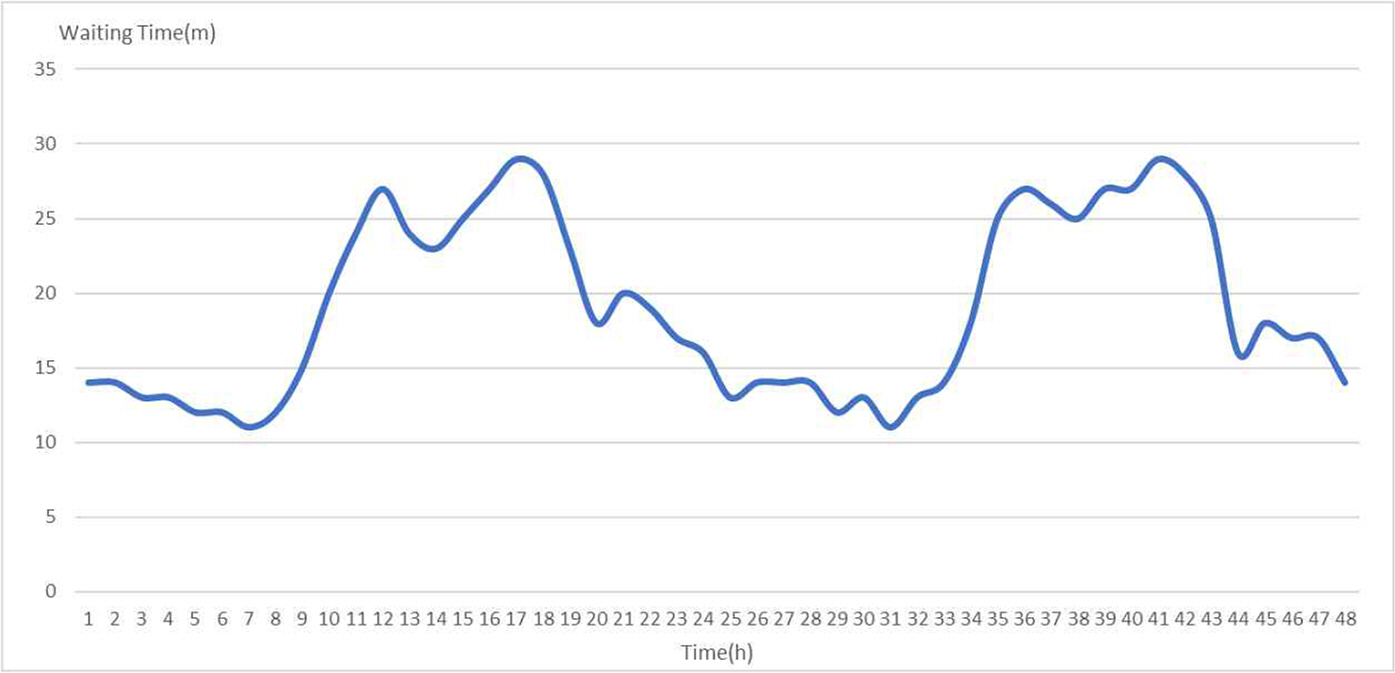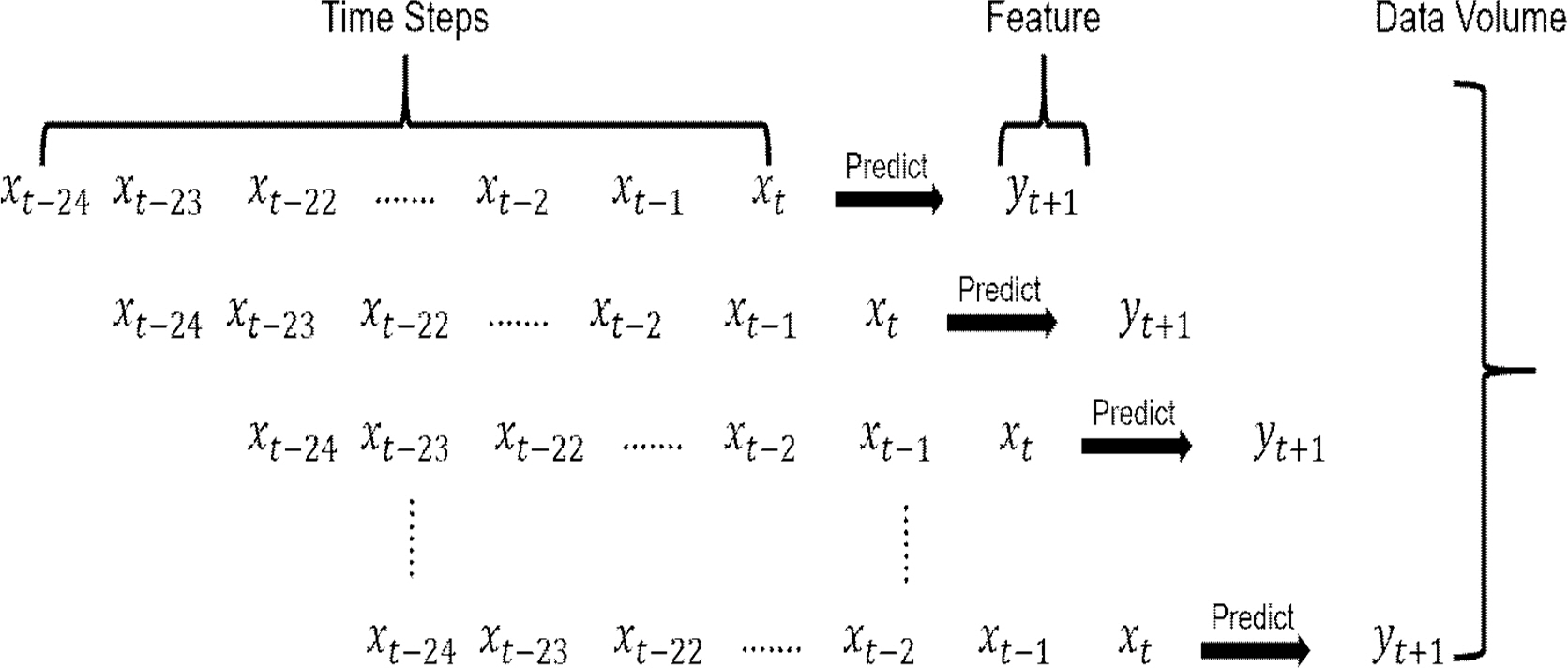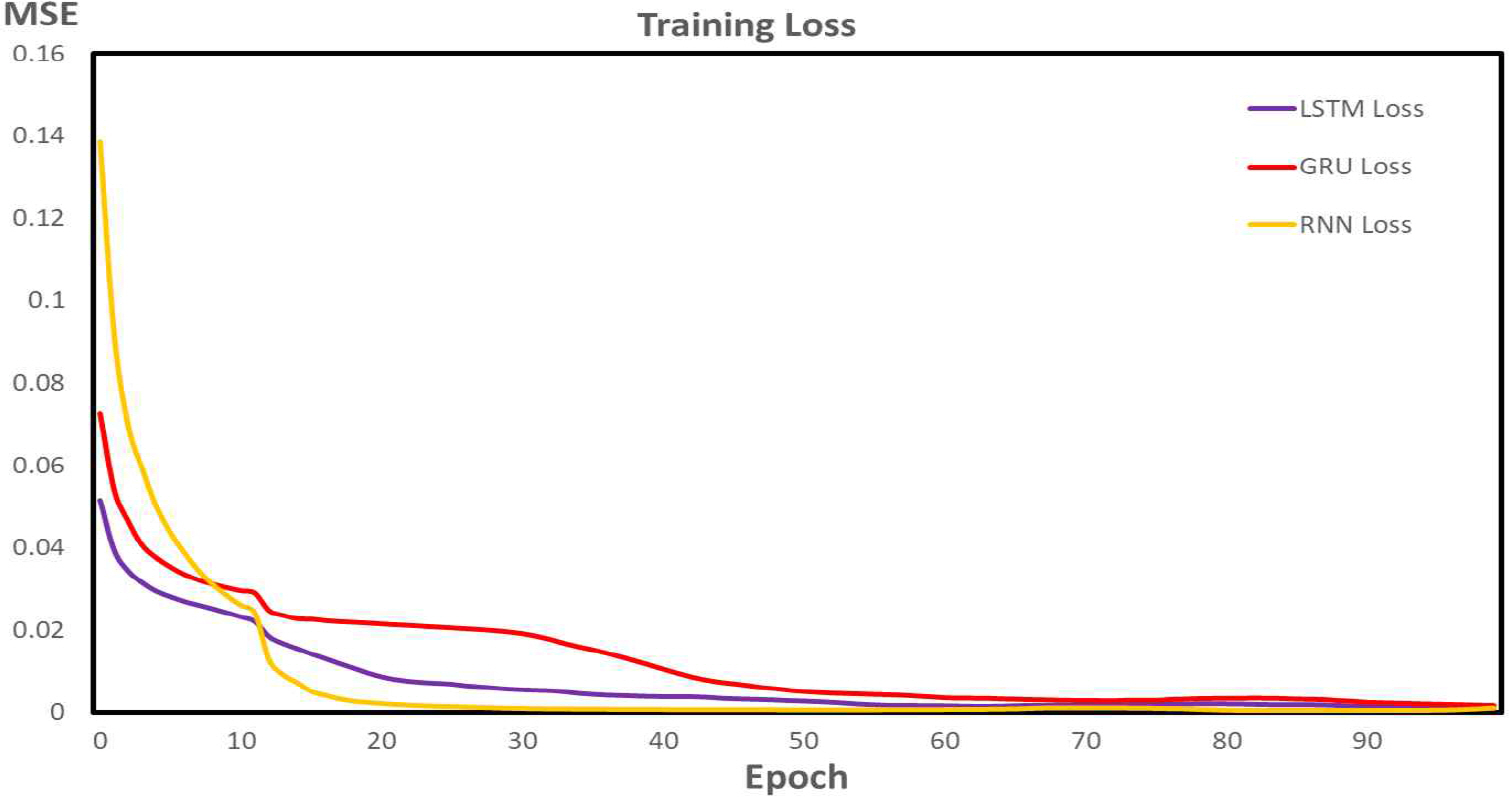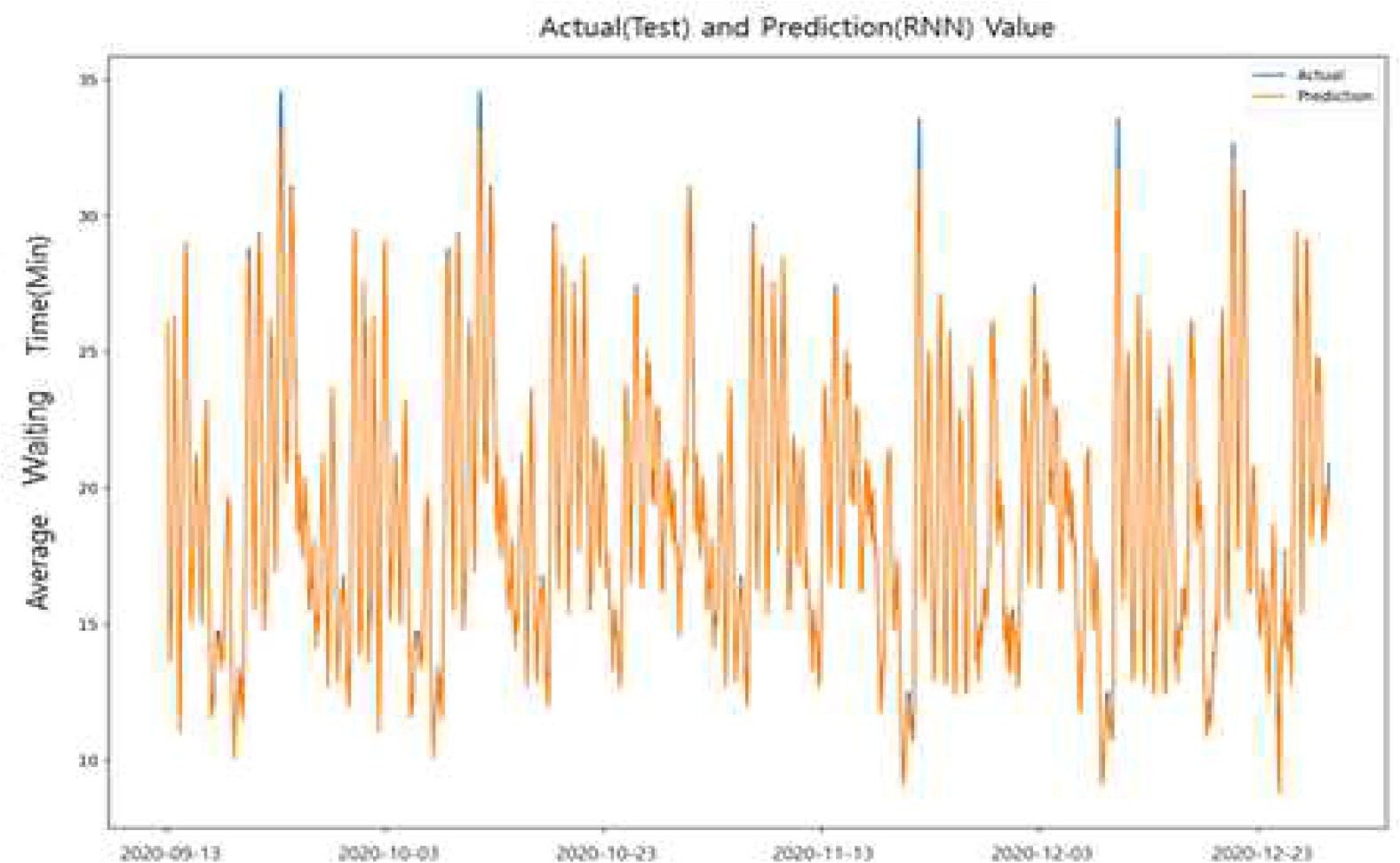 |
 |
| J Navig Port Res > Volume 46(4); 2022 > Article |
|
요 약
물동량의 증가로 인해 컨테이너 터미널의 혼잡도가 높아지고 있고 이에 따른 장치장 및 게이트에서의 반출입 차량의 대기시간이 큰 폭으로 길어지고 있어 차량 운용 및 항만 운영 비효율이 극심한 상태이다. 이러한 문제 해결을 위해 부산항의 경우, 항만 공사 및 터미널 측에서 반출입 차량 예약시스템(VBS), 터미널 차량 혼잡도 정보, 예상 작업 처리 시간 정보 등을 서비스하고 있지만 실제 대기시간과 상이한 경우가 있어 가시적인 효과는 여전히 미흡한 실정이다. 따라서 이러한 문제를 해결하기 위한 기초자료로써 본 연구에서는 부산 신항의 컨테이너 반출입 정보를 활용하여 딥러닝 기반의 반출입 차량 평균 대기시간 예측 모형을 제시하였다. 실제 평균 대기시간과의 비교를 통해 예측률을 검증한 결과 제시한 예측 모형이 높은 예측률을 보이는 것을 확인하였다.
ABSTRACT
Due to the increase in container cargo volume, the congestion of container terminals is increasing and the waiting time of gate in-out trucks has significantly lengthened at container yards and gates, resulting in severe inefficiency in gate in-out truck operations as well as port operations. To resolve this problem, the Busan Port Authority and terminal operator provide services such VBS, terminal congestion information, and expected operation processing time information. However, the visible effect remains insufficient, as it may differ from actual waiting time.. Thus, as basic data to resolve this problem, this study presents deep learning based average gate in-out truck waiting time prediction models, using container gate in-out information at Busan New Port. As a result of verifying the predictive rate through comparison with the actual average waiting time, it was confirmed that the proposed predictive models showed high predictive rate.
코로나 19로 인한 글로벌 팬데믹에 따라 전 세계적인 항만 물동량은 감소하는 추세를 보였지만, 환적화물에서 차지하는 비중이 50%를 넘는 중국이 코로나 19의 영향에서 벗어나고, 최대 수요국인 미국의 소비심리가 회복세를 보임에 따라 해상교역량이 늘어나 부산 신항의 컨테이너 물동량이 증가하고 있다.
이러한 컨테이너 물동량이 증가하는 추세에 비해 여전히 컨테이너 터미널 야드 장치장 및 게이트에서 반출입 차량 대기시간은 평균 1시간, 심각한 혼잡상황에서는 2∼3시간 이상 나타나는 등 터미널 내·외부 혼잡도 문제가 해결되지 않고 있는 상황이다. 또한, 부산 신항 운영 상의 문제로 특정 시간에 작업 물량이 집중되어 부산 신항 각 터미널 야드 장치율이 포화 상태에 도달하였으며 일부 부두의 경우, 컨테이너 장치율이 90% 이상 도달하는 등 터미널 내·외부의 혼잡 문제가 뚜렷하게 나타나고 있다. 컨테이너 터미널의 반출입 차량 혼잡 문제는 터미널 반출입 계획, 야드 장치 계획 및 터미널 내 작업 장비 계획 등 여러 작업 프로세스에 혼란을 야기하고, 이는 곧 항만 효율성의 저하로 이어진다.
터미널 내·외부의 혼잡에 따른 반출입 차량 대기시간 감소를 위해 부산항만공사와 각 터미널 운영사 측은 반출입 예약시스템(Vehicle Booking System; VBS)을 도입하여 시범운영 중에 있다. 최근에는 터미널 운영사 간 정보 공유를 통해 사전 반출입 정보, 터미널 차량 혼잡도 정보 및 양·적하 예상 시간 정보 등을 제공하는 부산항만공사의 물류공통포탈서비스가 운영 중에 있다. 그러나 이는 터미널 운영사 간 정보 공유의 한계와 같은 이유로 운송사 및 반출입 차량 운송 기사들이 체감할 수 있는 가시적인 효과는 여전히 미흡한 실정이라 할 수 있다.
컨테이너 터미널의 반출입 차량 혼잡의 현실적인 문제 해결을 위해서는 터미널 내 반출입 차량의 실제 대기시간의 파악이 우선적이며, 이를 바탕으로 항만 생산성 증대를 위한 반출입 차량 대기시간 예측이 필요하다. 이에 따라 본 연구에서는 부산 신항의 컨테이너 터미널 반출입 차량 혼잡 문제 해결을 위한 기초자료로써 반출입 차량의 터미널 내 대기시간에 대해 예측하고자 한다. 예측을 위한 모형으로는 복잡한 비선형 문제를 해결할 수 있는 시계열 딥러닝 예측 모형을 제시하고 부산 신항 터미널의 실제 운영 데이터를 활용해 예측 모형의 정확도를 구하고자 한다.
본 연구의 구성은 다음과 같이 이뤄진다. 우선 2장에서는 반출입 차량의 대기시간에 관한 선행 연구를 고찰하고, 기존 연구들과의 차별성을 소개한다. 3장에서는 본 연구의 대상이 될 부산 신항 컨테이너 터미널의 반출입 작업 프로세스에 대해 소개한다. 4장에서는 반출입 차량의 터미널 내 대기시간 문제를 설정하고, 대기시간 예측 모형을 제시한다. 5장에서는 대기시간 예측 모형의 실험 결과에 대해 분석하고 각 예측 모형의 객관적 성능에 대해 논한다. 마지막으로 6장에서는 본 연구 결과를 정리하고, 연구의 시사점과 한계점을 제시한다.
컨테이너 터미널에서 반출입 차량의 대기시간 감소를 통해 항만 생산성을 향상시키고자 하는 연구는 국내·외 다방면으로 이루어졌다.
국내의 경우 반출입 예약 시스템 도입을 통해 터미널 내부 혼잡 및 반출입 차량 대기시간을 감소시키려는 연구가 다수 진행되었다. 대표적인 관련 연구로, KMI(2001)는 국내 컨테이너 터미널의 야드 효율성 및 터미널 생산성 향상을 위해 반출입 예약 시스템 도입에 관한 설문을 시행하여 도입에 따른 문제점 및 해결방안을 제시하고 반출입 차량의 대기시간 및 터미널 내 체류시간 단축효과에 대해 분석하였으며, Kim et al.(2003)은 반출입 차량의 컨테이너 터미널 내 대기시간 단축을 위해 반출입 예약 시스템 도입에 따른 기대효과를 계량적으로 분석하였다. 또한, BDI(2015)는 터미널 운영사와 반출입 차량 운송사의 운영 효율성 제고를 위한 반출입 예약 시스템 도입과 관련해 국내·외 반출입 트럭 운영관리시스템의 현황 및 기술개발 수준에 대해 논하였으며, 이에 따른 정책적 시사점을 제시하였다.
Choi et al.(2006)은 컨테이너 터미널에서 반출입 차량의 체류시간 및 대기시간 감소와 차량 통행량 분산의 관점에서 통합 게이트와 분리 게이트 운영의 효과를 분석하고, 개별 선석 통합에 따른 게이트 운영 효율성이 높은 분리 게이트 시스템을 제안하였다. Choi et al.(2009)은 컨테이너 터미널 게이트 업무 생산성과 효율성에 미치는 문제점에 대한 실증 조사를 통해 게이트 정체현상에 대해 분석하였고, 이에 대한 운영적, 정책적 개선방안을 제시하였다.
Cha and Noh(2019)는 국내외 컨테이너 터미널을 대상으로 각 유형별 반출입 차량의 운영 프로세스를 분석하고, 체류시간에 영향을 미치는 요소를 제시하고 분석하였다.
이와 같이 운영 프로세스 개선 또는 정책적 제언 연구와 더불어 실제 터미널 운영 데이터를 활용하여 반출입 차량의 대기시간을 감소하고자 하는 연구도 다수 진행되었다. Kim et al.(2015)은 컨테이너 터미널 운영 계획 시뮬레이션의 일환으로 야드 및 반출입 차량의 생산성 향상을 위한 반출입 차량의 도착패턴을 분석한 바 있다.
항만 운영 효율성을 평가하는 하나의 지표로 반출입 차량의 통행량에 대해 Kim et al.(2019)와 Kim et al.(2020)은 기계학습의 한 종류인 선형 회귀모형, KNN(K-Nearest Neighbors) 모형, 랜덤 포레스트, Gaussian Naive Bayes 모델과 딥러닝 예측 모델의 한 종류인 LSTM(Long Short-Term Memory) 모델을 통해 예측하고 모델 간 비교를 통해 예측 결과의 객관성을 검증한 바 있다.
또한, 타부두 환적 운송(Inter Terminal Transportation; ITT)의 관점에서 터미널 혼잡 및 반출입 차량의 대기시간 문제를 해결하고자 하는 연구도 진행되었는데, Park et al.(2021)의 경우 완충지역을 활용한 타부두 환적 컨테이너 운송 방식을 제안하고 혼합정수계획법(Mixed Integer Programming; MIP)을 통해 완충지역 활용에 따른 반출입 차량 대기시간 감소 효과에 대해 분석하였다. 반출입 대기시간 감소와 관련하여 국내의 경우 반출입 예약 시스템 도입, 운영 프로세스 및 정책적 개선점에 대해 주로 연구되었으며 수리모형, 시뮬레이션 및 딥러닝 등의 정량적 분석 기법을 활용한 연구는 일정 부분 진행되었다.
반면 국외의 경우 주로 시뮬레이션, 수리모형, 기계학습 등을 활용한 연구가 다수 진행되었고 Keceil(2016) 및 Azab et al.(2019) 등의 경우 시뮬레이션 모델을 통해 반출입 차량의 도착이 항만 생산성에 미치는 영향에 대해 분석하였다.
수리모형의 경우 Chen et al.(2011), Chen and Jiang(2016) 및 Abdelmagid et al.(2021)이 반출입 차량 도착과 대기시간 감소의 측면에서 정수계획법, 이진정수계획법, 비선형계획법 등의 최적화 모형을 제시하고, 최적해를 통해 대기시간 감소를 검증하였다.
기계학습의 경우 Xie and Huynh(2010), Pham et al.(2011) 및 Van der Spoel et al.(2016)이 서포트 벡터 머신(Support Vector Machine; SVM), MLFNN(Multilayer Feed Forward Neural Network), 다중 회귀모형, 퍼지 회귀모형 등을 활용해 반출입 차량의 통행량 또는 대기시간을 예측하였고, 각 모형 간 예측 정확도를 검증하였다.
기존 수행된 연구들은 반출입 프로세스 개선 및 정책적 제언 연구를 통해 반출입 차량 대기시간 감소 또는 항만 내·외부의 교통혼잡을 감소하고자 하였다. 이후 터미널 운영 데이터를 기반으로 하는 실증적 분석 연구들이 다수 진행되었다.
이러한 연구에 따른 대기시간 감소와 항만 생산성 증대 효과에 관한 분석은 있었지만, 실제 컨테이너 운송 업무를 담당하는 운송사 및 운송 기사의 입장에서 체감되는 효과는 미흡하였다. 또한, 기존 연구에서는 반출입 차량 도착패턴 분석, 통행량 예측 등의 연구는 진행되었으나 차량이 실제 터미널 내에서 대기하는 시간에 대해 파악하고 예측하고자 하는 연구는 전무하였다.
따라서 본 연구는 기존 연구에서 수행되지 않았던 반출입 차량의 대기시간 예측을 통해 미래 시점에 반출입 차량이 터미널 내에서 대기하는 시간을 근거로 터미널 내부 혼잡도 추정 및 향후 반출입 차량의 운영 프로세스의 개선 등을 위한 기초연구로써 기존 연구와 차별성을 가진다.
컨테이너 터미널의 반입 작업은 크게 게이트 작업과 반입 차량 하차 작업으로 구분되며, 수출 컨테이너가 터미널에 게이트를 통해 들어와서 터미널 내 야드 장치장까지 운반되는 작업이다. 운송사는 컨테이너 반입 전에 EDI를 통해 사전반입예정정보(COPINO)를 터미널운영시스템(Terminal Operation System; TOS)에 전송한다. 반입 차량이 게이트에 도착하면 차량 및 컨테이너 번호를 COPINO와 비교 확인하고, 인수도증과 함께 컨테이너 장치 위치를 지정 받은 뒤 블록으로 이동한다. 블록에 도착한 반입 차량은 T/C(Transfer Crane) 작업을 위해 대기하고 있다가 작업 순서가 되면 T/C에 의해 컨테이너 하차 작업을 수행한다. 작업이 완료된 차량은 게이트로 이동한 뒤 터미널을 빠져나가면서 반입 작업이 완료된다.
컨테이너 터미널의 반출 작업은 반입 작업과 마찬가지로 크게 게이트 작업과 반출 차량 상차 작업으로 구분되며, 수입 컨테이너를 터미널 게이트를 통해 반출하기 위해 반출 차량이 장치장에서 컨테이너를 실어나가는 작업이다. 반출 작업은 블록으로 이동하여 T/C 작업을 위해 대기하는 과정까지 반입 작업과 동일한 프로세스로 이루어지며, T/C가 작업 가능한 상태가 되면 컨테이너 상차 작업을 수행한다. 작업이 완료된 차량은 게이트로 이동한 뒤 터미널을 빠져나가면서 반출 작업이 완료된다.
반출입 차량의 터미널 내 대기시간을 예측하기 위해 우선적으로 반출입 차량의 대기시간에 대해 정의할 필요가 있다. 일반적으로 반출입 차량의 체류시간은 차량이 게이트를 통해 들어온 시점부터 컨테이너 상‧하차 작업을 완료 후 게이트를 통해 나간 시점까지의 소요 시간을 말한다. 그러나 터미널 실무 담당자에 따르면, 반출입 차량이 터미널 외부에서 기다리는 경우는 거의 없으며 터미널 내부의 상‧하차 작업 완료 후 터미널 외부로 나가는 시간은 터미널 내부 혼잡도에 큰 영향을 미치지 않는다고 한다. 결국 차량이 터미널에서 소요하는 전체 시간 중에서 실제 터미널 혼잡과 직접적인 관련이 있는 시간은 게이트 도착부터 컨테이너 상·하차 작업 완료까지의 시간이라 할 수 있다.
따라서 본 연구의 예측 모형에 적용할 반출입 차량의 대기시간은 각 개별 컨테이너 반출입 차량이 게이트를 통과한 시점부터 야드 내 장치장에서의 컨테이너 상‧하차 작업이 완료된 시점과의 차이로 정의한다.
본 연구에서는 부산 신항 컨테이너 터미널 A를 실증 분석 대상으로 2020년의 컨테이너 반출입 데이터를 분석에 활용한다. 예측 모형에 적용할 분석 대상 자료는 결측값 등 전처리 과정을 거친 후, 1년 간 처리된 반출입 컨테이너의 수는 총 1,971,519개이며, 이를 시간대 별 평균 대기시간으로 변환하였다.
Fig. 1은 연구 대상 터미널 내 시간대 별 반출입 대기시간을 패턴화한 것이다. 컨테이너 터미널의 운영 특성에 따라 야간 및 새벽시간에 대기시간이 감소하며 주간 피크시간 대에 물량이 집중되어 대기시간이 증가하는 패턴을 보이고 있다. 또한, 반출입 대기시간 패턴은 터미널 내 처리 물량의 증감에 따라 8시간 단위로 증가하고 감소하는 추세를 보인다.
반출입 차량의 대기시간 예측 모형은 입력 데이터의 구조가 비선형성을 가지는 단변량 시계열 자료임을 고려하여 복잡한 비선형 문제를 해결할 수 있는 시계열 딥러닝 모형인 RNN(Recurrent Neural Network) 모형, LSTM 모형 및 GRU(Gated Recurrent Unit) 모형을 활용한다.
RNN 모형은 자연어 등과 같이 시퀀스를 가지면서 시간의 흐름에 따라 변하는 데이터에 적합한 모형으로 시계열 데이터 구조에서 좋은 예측률을 보이지만 입력 데이터의 타임스텝(TimeStep)이 길어질수록 학습 가중치가 줄어드는 장기 의존성 문제를 보일 수 있다.(Bengio et al., 1994)
LSTM 모형은 RNN 모형의 장기 의존성 문제를 해결하기 위해 제안되었고 입력 및 출력층 안팎에 기존 정보를 보존하거나 버리는 셀 스테이트(Cell State) 및 망각 게이트층(Forget Gate Layer)을 추가한다는 점에서 RNN 모형과 차이를 가진다.(Hochreiter and Schmidhuber, 1997)
또한, GRU 모형은 LSTM 모형과 대부분 비슷한 네트워크 구조를 가지지만 구조를 경량화하여 LSTM과 비교했을 때 비슷한 성능을 보이지만 학습속도가 빠르다는 장점을 가진다.(Chung et al., 2014)
이와 같이 예측 모형에 적용할 입력 데이터의 구조가 비선형적 구조를 가지고 일정한 시퀀스를 지닌 시계열 데이터인 예측의 경우 딥러닝 기반의 RNN, LSTM 및 GRU 모형이 기존 예측 모형들에 대비하여 우수한 예측률을 보일 것으로 사료된다.
본 연구에서 각 예측 모형은 과거 8시간∼48시간 내의 시간대 별 평균 대기시간을 기반으로 미래 1시간 후의 평균 대기시간을 예측하는 지속성 구조로 설계되며, 기존의 1차원의 시간대 별 평균 대기시간을 RNN 기반의 딥러닝 예측 모형에 적합한 3차원 시계열 객체 데이터로 변환한다.(Fig. 2)
딥러닝 모형에서 최적의 하이퍼 파라미터를 선택하고 조정하는 것은 모형의 성능에 큰 영향을 미칠 수 있다. 딥러닝 모형의 하이퍼 파라미터는 일반적인 조정 방법이 없으며 입력 데이터와 모형의 복잡도에 따라 적합한 값을 찾아가는 과정을 반복해야 한다.(Reimers and Gurevych, 2017)
본 연구에서는 반출입 차량 평균 대기시간 예측 모형의 하이퍼 파라미터 산정을 위해 특성이 각기 다른 LSTM, GRU 및 RNN 모형의 반복적 실험을 통해 최적 하이퍼 파라미터 탐색을 수행하였다.
최종적으로 산정된 각 모형의 최적 하이퍼 파라미터는 Table 1과 같으며, 산정된 하이퍼 파라미터 값에 따라 예측 모형의 학습을 수행하였다.
본 연구는 CPU Intel i9-10900X, RAM 128GB, GPU Nvidia GeForce RTX 3090 x4, Python 3.7.11 기반의 Tensorflow 2.4.1 환경의 워크스테이션에서 수행되었다. 학습에 앞서 예측 모형의 모든 가중치에 동일한 학습율(Learning Rate)을 적용하고, 딥러닝 모형에 많이 사용되는 데이터 정규화 방식인 최소-최대 정규화(Min-Max Scaling)를 입력 데이터에 적용하였다.
객관적인 예측 모형의 성능 평가를 위해 전체 반출입 차량 대기시간 데이터 중 과거 데이터로부터 70%를 추출하여 학습 데이터셋을 구성하고, 학습 데이터셋의 20%를 학습 결과 검증을 위한 검증 데이터셋으로 분할한다. 최종적인 학습 모델의 성능 평가를 위해 최근 반출입 차량 대기시간 데이터로부터 30%를 추출하여 테스트 데이터셋으로 구성한다.
또한, 예측 모형의 손실(Loss)은 시계열 예측에서 주로 사용되는 평균제곱오차(Mean Squared Error; MSE)로 설정하여 학습을 진행하였다. 각 모형의 최적 학습 결과는 Fig. 3과 같으며, 학습이 완료된 RNN, LSTM 및 GRU 모형 모두 손실값이 학습 횟수(Epoch)의 증가에 따라 감소하고 있고 0에 가깝게 수렴되는 것을 볼 때, 과대적합 및 과소적합 없이 예측 모형이 학습되었다고 해석할 수 있다.
학습한 예측 모형의 성능 검증을 위해 반출입 평균 대기시간 테스트 데이터셋의 실측치와 예측치를 비교하였다. 예측 결과의 직관적 이해를 위해 분석에 앞서 정규화된 데이터를 기존의 평균 대기시간(분)으로 변환하였다.
입력 데이터의 타입스텝은 여러 테스트 케이스 중 Fig. 1의 시간대 별 반출입 대기시간 패턴이 8시간 간격으로 기울기 변화가 발생함에 따라 입력 데이터의 타임스텝을 8시간, 16시간, 24시간, 48시간으로 설정했을 때 시계열 패턴의 증감을 적절히 반영하는 것으로 확인되었다.
각 모형의 성능 지표는 수치 예측 기법에서 주로 사용되는 검증 방법인 절대평균오차비율(Mean Absolute Percentage Error; MAPE), 절대평균오차(Mean Absolute Error; MAE) 및 평균제곱근오차(Root Mean Squared Error; RMSE)에 따라 검증하고, 추가적으로 모형이 학습되고 예측하는데 소요되는 시간인 Runtime을 계산하여 비교하였다.
예측 결과인 Table 2에 따르면, RNN, LSTM 및 GRU 모형 모두 입력 데이터의 타임스텝을 8시간으로 설정하여 예측을 수행했을 때 가장 좋은 결과를 보였으며 이는 주간 피크시간대와 야간 및 새벽 시간대의 반출입 패턴이 예측에 적절하게 반영된 것으로 판단된다. 전반적인 각 모형의 예측 정확도는 96%~98%로 정확한 예측을 하고 있으며, 학습 시간 또한 3분 내의 짧은 시간을 보인다. 이러한 결과를 통해, 반출입 차량의 대기시간 예측 문제에서 RNN, LSTM 및 GRU 모형이 예측에 적합하다고 판단된다.
그러나, 48시간 내의 단기 타임스텝 예측에서 각 모형 중 RNN 모형이 장기 의존성 문제의 발생 없이 반출입 차량의 대기시간 패턴을 학습하여 가장 높은 예측 정확도를 보이고 있고, 예측 정확도 및 예측 오차의 변동폭 또한 크지 않다. 복잡하고 무거운 네트워크 구조에 비해 학습 시간도 LSTM 및 GRU 모형과 1분 내의 작은 차이를 보이고 있어 반출입 차량의 시간대 별 대기시간 예측 문제에 있어 뚜렷한 장점을 보이고 있다.
반면, LSTM 및 GRU 모형은 RNN 네트워크 구조를 개선한 모형임에도 불구하고 RNN 모형에 비해 학습 속도는 빠르지만 낮은 예측 정확도를 보이는데 이는 반출입 차량의 대기시간이 주간과 야간으로 나뉘는 뚜렷한 패턴을 지니고, LSTM 및 GRU 모형의 망각 게이트층에서 시계열 패턴을 일부 초기화시켜 패턴을 적절히 반영하지 못하는 것으로 보인다. 입력 데이터의 타임스텝을 48시간 이상으로 설정하였을 때 RNN 모형의 장기 의존성 문제 발생에 따라 LSTM 및 GRU 모형의 예측 정확도가 RNN 모형에 비해 높아질 수 있지만, 1시간 이후의 단기 예측 문제에서 장기 타임스텝의 적용이 적절하지 않다고 판단된다.
일반적인 시계열 예측의 경우, LSTM 및 GRU 모형이 RNN 모형에 비해 높은 예측 정확도를 보이지만 본 연구에서는 일반적 경우와는 달리 RNN 모형이 가장 높은 예측 정확도를 보이며 우수한 성능을 보이는 것을 확인할 수 있다.
최근 항만 물동량이 급증하는 추세를 보이고 컨테이너 터미널의 장치장 부족 현상이 지속적으로 나타나고 있다. 또한, 터미널의 외부트럭 반출입 물동량은 특정 시간대에 집중되기 때문에 컨테이너 터미널 내부 혼잡도 문제가 더욱 심화되고 있다. 이러한 반출입에 따른 터미널 내부 혼잡은 터미널 내 장비 운용 계획 및 반출입 작업 처리 속도 등 여러 터미널 작업 프로세스의 흐름에 비효율을 야기하고, 항만 생산성 저하에 직접적인 영향을 미칠 수 있다.
터미널 내 반출입 차량 혼잡 문제의 현실적 해결을 위해서는 반출입 차량의 실제 대기시간의 파악이 우선적이며, 이를 바탕으로 반출입 차량의 대기시간 예측이 필요하다. 그러나 실제 터미널에서는 COPINO를 통해 사전 반출입 정보는 알 수 있으나, 실제 반출입 도착 시점에 대해 알 수 없고 장치장의 프리타임에 맞춰 컨테이너를 반출입 해야하기 때문에 반출입 차량의 대기시간에 대한 예측이 어려운 실정이다.
이에 따라 본 연구에서는 컨테이너 터미널의 반출입 차량의 대기시간 급증 문제해결을 위한 기초 자료로써 시계열 예측에 적합한 딥러닝 모형인 RNN, LSTM 및 GRU 모형을 통해 시간대 별 반출입 대기시간 패턴에 따라 설정한 타임스텝을 기반으로 컨테이너 반출입 차량의 시간대 별 평균 대기시간 예측 모형을 제시하였다. 부산 신항 컨테이너 터미널의 실제 컨테이너 반출입 데이터를 활용하여 제시한 각 딥러닝 예측 모형을 학습하고 실측치와의 비교를 통해 예측 모형의 성능을 검증하였다. 그 결과, RNN, LSTM 및 GRU 모형 모두 예측에 적합한 모형임을 확인하였다. 특히 단기 타임스텝에서 반출입 대기시간 패턴을 가장 적절히 반영한 RNN 모형이 높은 예측 정확도를 보였다.
본 연구에서 제시한 반출입 차량의 대기시간 예측 모형은 항만 운영 주체인 터미널 운영사의 관점에서 터미널 내부 혼잡도를 조기에 파악하여 한정된 인력 및 장비를 효율적으로 배치함으로써 반출입 운영 프로세스의 흐름 개선, 터미널 내부 혼잡도 완화 등 여러 운영적 개선 효과를 기대할 수 있다.
본 예측 모형은 부산 신항 특정 터미널만을 실증 분석 대상으로 하기 때문에 본 반출입 차량 대기시간 예측 모형에 부산항 전체의 반출입 패턴을 반영할 필요가 있다. 따라서 향후 연구에서는 부산항 여러 터미널의 반출입 패턴을 기반으로 선박 입항 정보, 컨테이너 양·적하 정보 등 터미널 내부 혼잡도에 영향을 미치는 요소를 포함하는 다변량 예측으로 컨테이너 터미널의 종합적인 혼잡도를 고려한 반출입 차량 대기시간 예측 연구가 필요할 것으로 판단된다.
Table 1.
Optimal Hyper-Parameters by predictive models
| Parameters | LSTM | GRU | RNN |
|---|---|---|---|
| Epoch | 500 | 500 | 500 |
| Batch Size | 1,024 | 1,024 | 1,024 |
| Layer | 2 | 5 | 3 |
| Neuron Unit | 64, 128 | 64 | 32, 64, 128 |
| Dropout | 0.2 | 0.2 | 0.2 |
| Learning Rate | 0.0025 | 0.0025 | 0.0025 |
| Optimizer | Adam | Adam | Adam |
Table 2.
Average waiting time prediction results per TimeStep
참고문헌
[1] Abdelmagid, A, Gheith, M and Eltawil, A(2021), ““A Comprehensive Review of the Truck Appointment Scheduling Models and Directions for Future Research””, Transport Reviews, Vol. 42, No. 1, pp. 102-126.

[2] Azab, A, Karam, A and Eltawil, A(2019), ““A Simulation-Based Optimization Approach for External Trucks Appointment Scheduling in Container Terminals””, International Journal of Modelling and Simulation, Vol. 40, No. 5, pp. 321-338.

[3] Bengio, Y, Simard, P and Frasconi, P(1994), ““Learning Long-Term Dependencies with Gradient Descent is Difficult””, IEEE Transactions on Neural Networks, Vol. 5, No. 5, pp. 157-166.


[4] Busan Development Institute(BDI)(2015), ““Current Status and Implications of Gate In/Out Truck Operation and Management System in Container Terminal””, Busan Development Institute, Logistics Trends of East Asia, (2015.
[5] Cha, SH and Noh, CK(2019), ““A Comparative Study of Truck Turn-Time in Empty Container””, Journal of International Trade and Commerce, Vol. 15, No. 3, pp. 683-712.

[6] Chen, G and Jiang, L(2016), ““Managing Customer Arrivals with Time Windows : A Case of Truck Arrivals at a Congested Container Terminal””, Annals of Operations Research, Vol. 244, pp. 346-365.


[7] Chen, X, Zhou, X and List, G(2011), ““Using Time Varying Tolls to Optimize Truck Arrivals at Ports””, Transportation Research, Vol. 47, No. 6, pp. 965-982.

[8] Choi, HR, Lee, HI, Shon, JR, Choi, SP, Kim, CS and Shin, JJ(2009), ““A Study on Improvement of Gate Congestion in Container Terminal””, Journal of the Korean Society of Supply Chain Management, Vol. 9, No. 2, pp. 1-10.
[9] Choi, YS, Ha, TY and Kim, WS(2006), ““Analysis of Operational Impact for Separated Gate System in Port Container Terminal””, Journal of Korean Navigation and Port Research, Vol. 30, No. 5, pp. 389-396.

[10] Chung, J, Gulcehre, J and Bengio, Y(2014), ““Empirical Evaluation of Gated Recurrent Neural Networks on Sequence Modeling””, arXiv preprint arXiv, Vol. 1412, pp. 3555.
[11] Hochreiter, S and Schmidhuber, J(1997), ““Long Short-Term Memory””, Neural Computation, Vol. 9, No. 8, pp. 1735-1780.


[12] Keceli, Y(2016), ““A simulation model for gate operations in multi purpose cargo terminals””, Maritime Policy & Management, Vol. 43, No. 8, pp. 945-958.

[13] Kim, JH, Kim, SW, Nam, BA, Choi, JW, Jang, DW, Kim, KH and Hong, SD(2015), ““Arrival Pattern Analysis of Gate In-Out Trucks in Container Terminal””, Korean Institute of Industrial Engineers, 2015 Fall Conference of Korean Institute of Industrial Engineers, pp. 1097-1102.
[14] Kim, JS, Kim, JH, Shin, HJ and Lee, GW(2020), ““Prediction of Truck Arrivals at Container Terminals based on LSTM Network””, Korean Society of Transportation, Proceedings of the KOR-KST Conference, pp. 240-241.
[15] Kim, SH, Kim, JR, Cho, HJ and Lim, CH(2019), ““A Study on the Prediction of Traffic Volume by Time of Vehicles Entering and Exiting Port Container Terminal Using Machine Learning””, Korean Institute of Industrial Engineers, 2019 Fall Conference of Korean Institute of Industrial Engineers, pp. 1412-1417.
[16] Kim, WS, Choi, YS and Ha, TY(2003), ““Quantitative Analysis for the Expected Effect of Tractor Appointment System””, Journal of Korean Navigation and Port Research, Vol. 27, No. 4, pp. 403-407.

[17] Korea Maritime Institute(KMI)(2001), ““A Study on the Introduction of Truck Appointment System for Container Cargo””, pp. 117.
[18] Lee, SJ2011. “A Study on the Improvement of the Gate In-out Operation in the Container Terminals”, Master Thesis of. Korea Maritime and Ocean University.
[19] Park, HJ, Shin, JY and Choi, YH(2021), ““A Study on the Improvement of Inter-Terminal Transportation Using Buffer Space””, Journal of Korean Navigation and Port Research, Vol. 45, No. 6, pp. 43-53.
[20] Pham, Q, Huynh, N and Xie, Y(2011), “Estimating Truck Queuing Time at Marine Terminal Gates”, Journal of the Transportation Research Board. 2222):Transportation Research Board of the National Academies; Washington, D.C: p. 43-53.


[21] Reimers, N and Gurevych, I(2017), ““Optimal Hyper-Parameters for Deep Lstm-Networks for Sequence Labeling Tasks””, arXiv preprint arXiv, Vol. 1707, pp. 06799.
[22] Van Der Spoel, S, Armit, C and Van Hillegersberg, J(2016), ““A Benchmark for Predicting Turnaround Time for Trucks at a Container Terminal””.
- TOOLS
-
METRICS

-
- 0 Crossref
- 0 Scopus
- 1,330 View
- 13 Download
- Related articles
-
Prediciton Model for External Truck Turnaround Time in Container Terminal2024 February;48(1)
3D Mapping for Improving the Safety of Autonomous Driving in Container Terminals2023 October;47(5)







 PDF Links
PDF Links PubReader
PubReader ePub Link
ePub Link Full text via DOI
Full text via DOI Download Citation
Download Citation Print
Print



